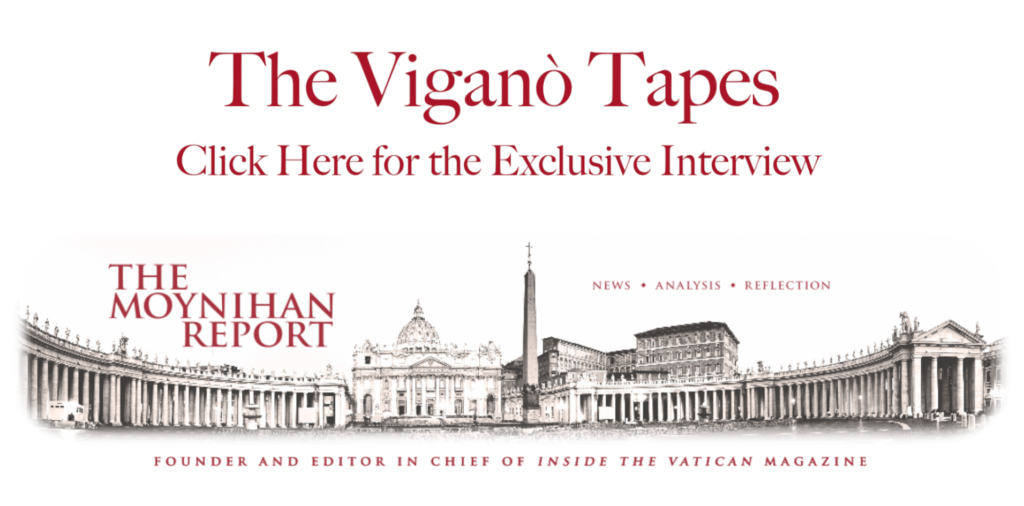Today’s letter includes a link to the third of our 18 Viganò Tapes (link here or below). Please subscribe to our YouTube channel so that you will be notified immediately when we post the rest of these tapes and all future YouTube content.
Today’s letter also includes a link to the newest edition of Inside the Vatican magazine which has a comprehensive dossier on the new papal decree Traditionis Custodes (“Custodians or Guardians of Tradition”). Please click on this link to see our online edition and/or to order a subscription to the print edition.
Finally, Pope Francis today on his flight back from Slovakia to Rome made some very strong remarks about the issue of abortion and communion. The issue is well handled by The Pillar so I have included excerpts from that article below as well as a link to the original article.
Below is an ad for very well-made liturgical products produced by a friend of mine. Please consider visiting his site.

Pope Francis on the airplane today, answering reporters’ questions. (CNS photo/Paul Haring)
Abortion and the Eucharist: What did the Pope just say? (link)
A Pillar Explainer
During the return flight from his recent trip to Hungary and Slovakia, Pope Francis on Wednesday fielded press questions on the issue of holy communion for Catholic politicians who promote legal protection for abortion.
(…)
What Pope Francis said
“Those who are not in the community, cannot receive communion,” Francis told reporters on Wednesday. “Out of the community: excommunicated. It’s a harsh word, but they don’t belong in the community, because they were not baptized, or because they are estranged from it.”
The Pope made the comments while discussing the Church’s absolute prohibition of abortion, which, Francis said, is always the taking of an innocent human life.
Abortion is “more than a ‘problem.’” said Francis: “It’s a homicide. No middle terms. Whomever does an abortion, kills.” The pope went on to say that for the Church to countenance legal abortion as morally acceptable would be for the Church to accept “daily homicide.”
Catholic politicians who champion legal protections for abortion do not present a theological problem to be addressed, the pope explained, because the theology of the issue is “simple.”
Instead, he said, the question is how to deal in a pastoral context with such politicians.
“The problem is pastoral, how do we, as bishops, manage this principle,” he said. “If we look at the history of the Church, we will see that every time the bishops acted not as pastors in a problem, they became politicians.”
Francis stressed that his answers were meant to address general principles, and should not be applied to specific politicians in the United States because, he said, he didn’t know the details of individual cases. But, he said, pastoral action does not mean ignoring the problem of abortion, or those Catholics who support it.
“And what should the pastor do? He shouldn’t go around condemning. And he must also be a pastor with those who are excommunicated, and be so with God’s style, which is closeness, compassion and tenderness.”
“Those people who are not in the community cannot take communion, because they are out of the community,” the pope continued. “It is not a punishment: Communion is linked to the community.”
The focus, he said, should not be on labeling individuals as “excommunicated,” but instead considering them to be people “temporarily outside of the community” who remain “children of God and need our pastoral action and they want, and need, our pastoral closeness. Then the pastors work things out by the Spirit of God.”
The Pope said that he had not personally denied the Eucharist to a politician supportive of abortion protections, but that he was not aware that any had presented themselves to him for holy communion.
What does the Church’s law say?
Canon 915 of the Code of Canon Law says that “those who have been excommunicated or interdicted after the imposition or declaration of the penalty and others obstinately persevering in manifest grave sin are not to be admitted to holy communion.”
(…)
In 2004, Cardinal Joseph Ratzinger explained to U.S. bishops that:
Regarding the grave sin of abortion or euthanasia, when a person’s formal cooperation becomes manifest (understood, in the case of a Catholic politician, as his consistently campaigning and voting for permissive abortion and euthanasia laws), his Pastor should meet with him, instructing him about the Church’s teaching, informing him that he is not to present himself for Holy Communion until he brings to an end the objective situation of sin, and warning him that he will otherwise be denied the Eucharist.
“When ‘these precautionary measures have not had their effect or in which they were not possible,’ and the person in question, with obstinate persistence, still presents himself to receive the Holy Eucharist, ‘the minister of Holy Communion must refuse to distribute it’.”
This decision, properly speaking, is not a sanction or a penalty. Nor is the minister of Holy Communion passing judgement on the person’s subjective guilt, but rather is reacting to the person’s public unworthiness to receive Holy Communion due to an objective situation of sin.
That advice seems to be consistent with the pope’s remarks on Wednesday — namely, that the issue should be addressed between a pastor — which can include a diocesan bishop, the chief pastor of his diocese — and a particular Catholic.
The pope’s Wednesday remarks also seem consistent with a 2007 document from South American bishops, which was mostly written by Pope Francis. That document explains that:
“We hope that legislators, heads of government, and health professionals, conscious of the dignity of human life and of the rootedness of the family in our peoples, will defend and protect it from the abominable crimes of abortion and euthanasia… We must adhere to ‘Eucharistic coherence,’ that is, be conscious that they cannot receive holy communion and at the same time act with deeds or words against the commandments, particularly when abortion, euthanasia, and other grave crimes against life and family are encouraged. This responsibility weighs particularly over legislators, heads of governments, and health professionals.”
What’s the context of the Pope’s remarks?
Francis was responding to questions from the English-speaking press, which came in reference to ongoing debate among U.S. Church leaders over the situation of President Joe Biden, who is Catholic.
For decades, Biden maintained that he personally accepted the Church’s teaching on the dignity of human life from the moment of conception, and on abortion, but said he did not believe in imposing his “personal” beliefs on others through public policy.
During the 2020 presidential campaign, Biden adopted a more stridently pro-abortion stance, promising to enshrine the full scope of the Supreme Court decision Roe v. Wade into federal law, and to allow federal funding for abortion.
In recent weeks, the president has expressed even more concrete support for abortion, and reversed his long-standing affirmation that life begins at conception.
Responding to a state law in Texas banning abortion from the point at which a fetal heartbeat can be detected, Biden said he does not agree with those who believe that life begins at conception.
The president has directed a “whole-of-government response” to oppose the Texas law and enshrine legal protections for abortion.
Biden’s bishop in Washington, Cardinal Wilton Gregory, told a press event last week that the president’s approach to the issue was not “demonstrating Catholic teaching.”
(…)
The Shenandoah Valley Experience Pilgrimage
October 24 – 29, 2021
From the rolling waters of the Shenandoah River to the rich, orange sunsets of Shenandoah National Park in the Blue Ridge Mountains; from the bountiful farmland of this river valley to the many National Shrines in the area; we will encounter the beating heart of the Church and America today. Come to renew your soul, rest your mind, and ignite your heart.
Click the button below to view the itinerary and to see available booking options. Space is limited so don’t miss out!








Facebook Comments